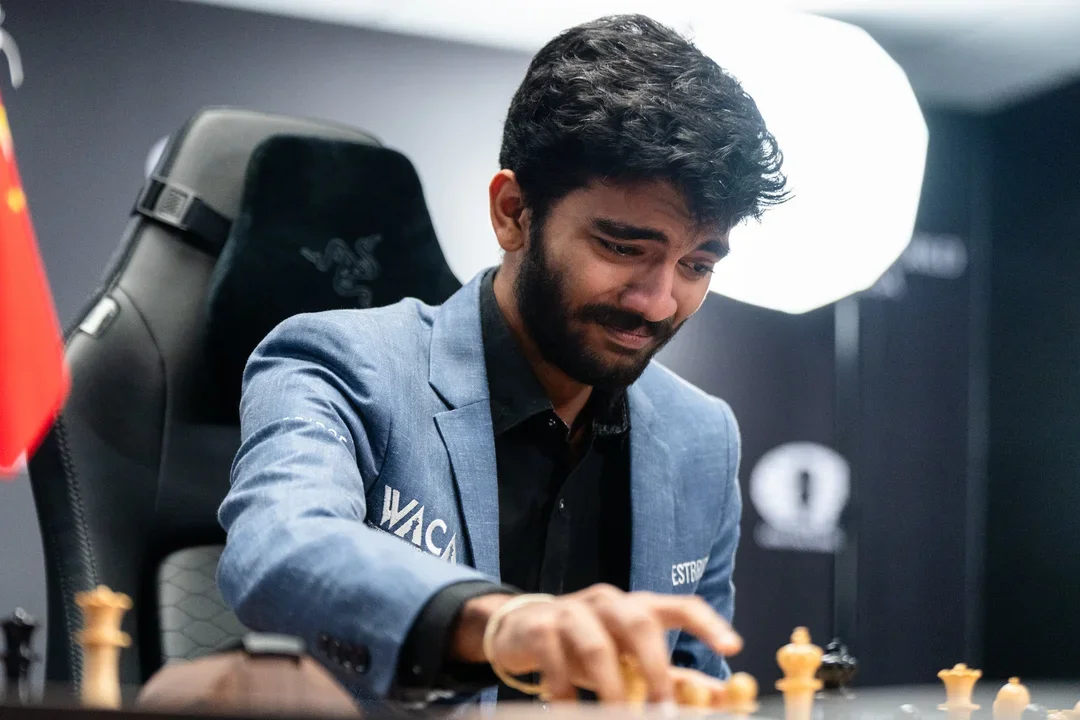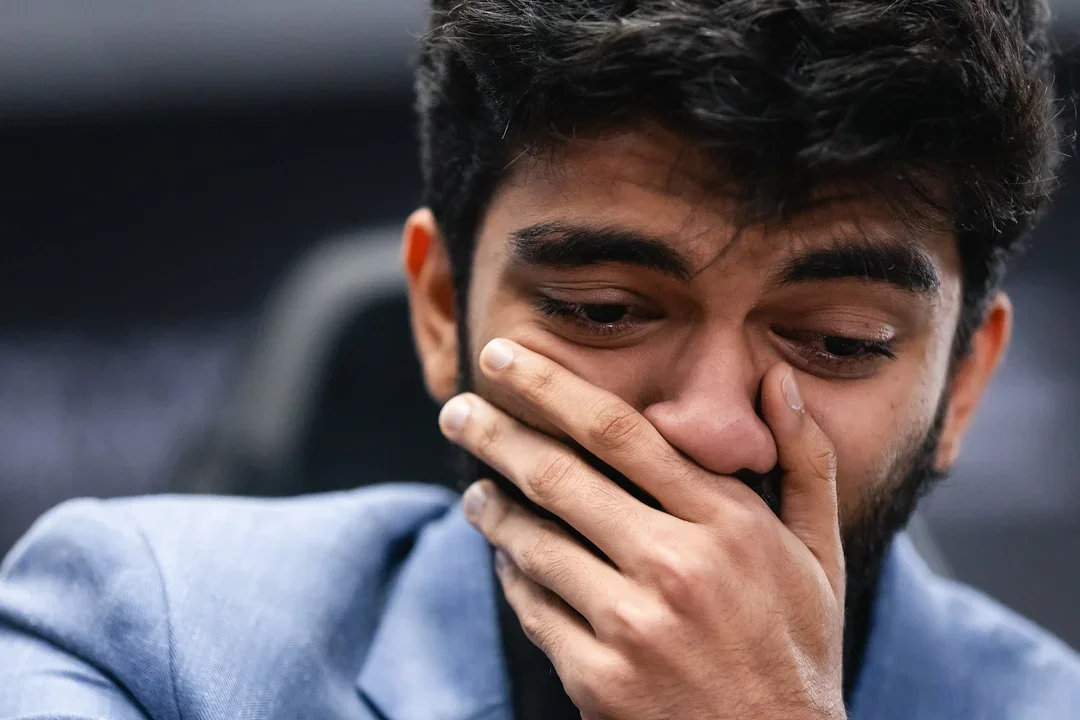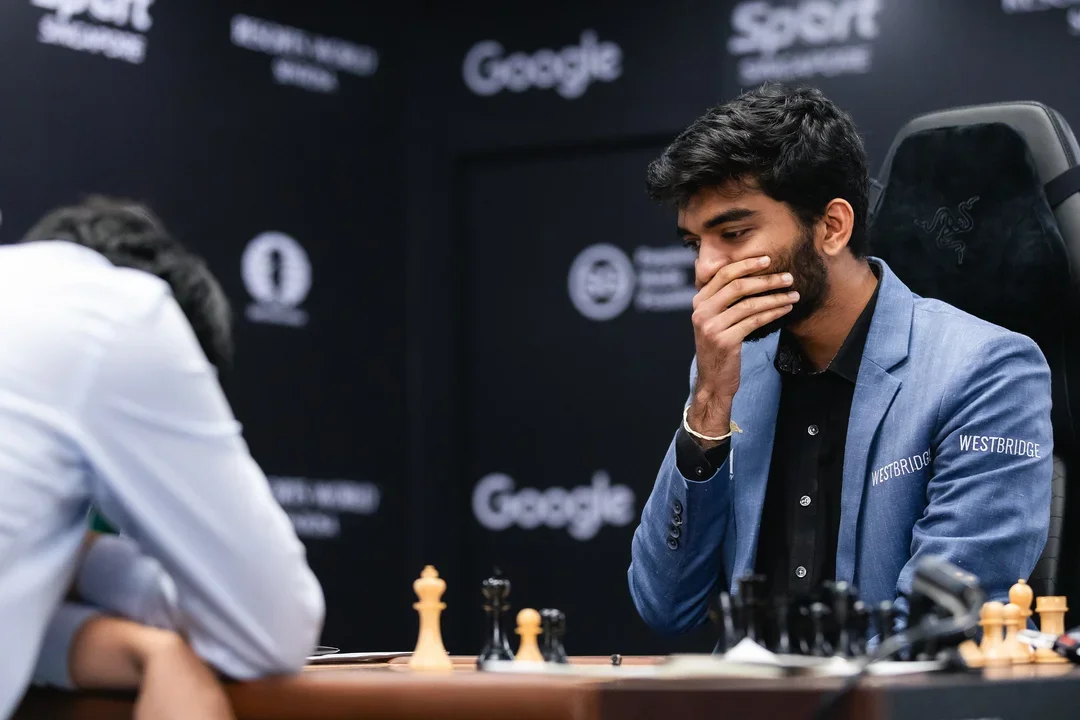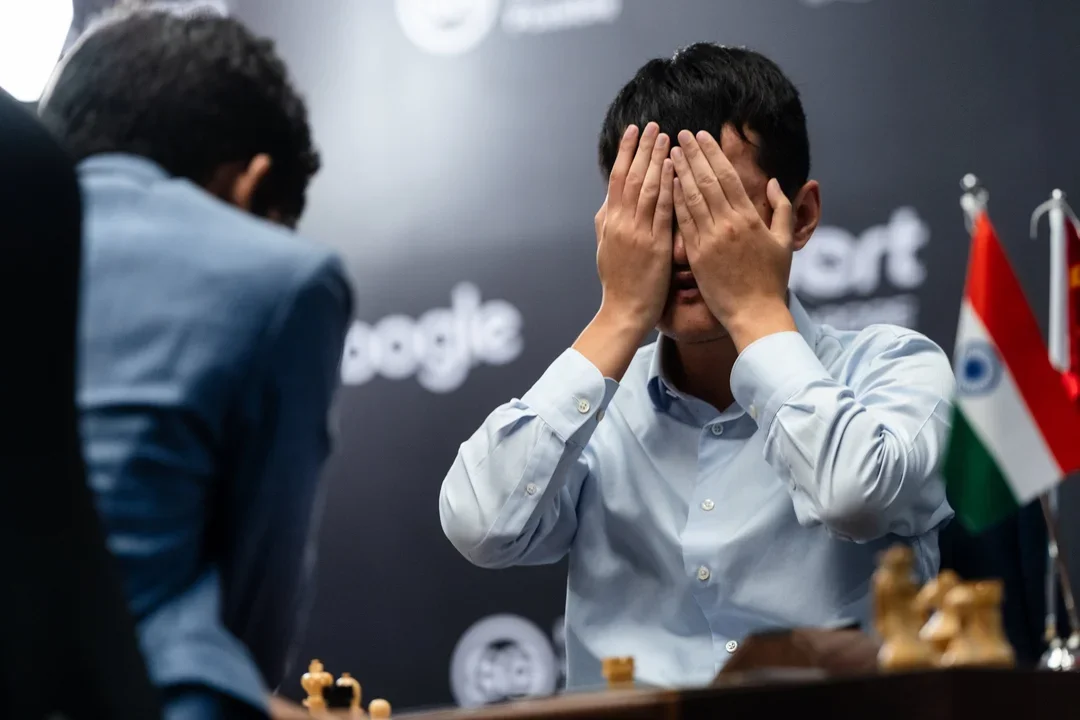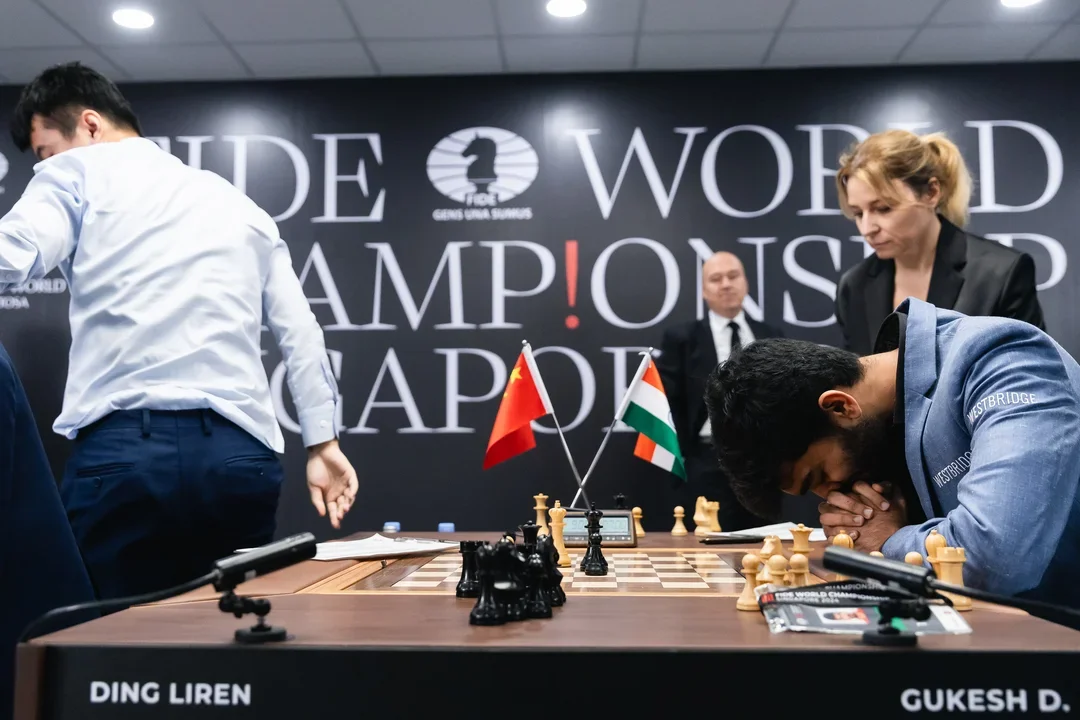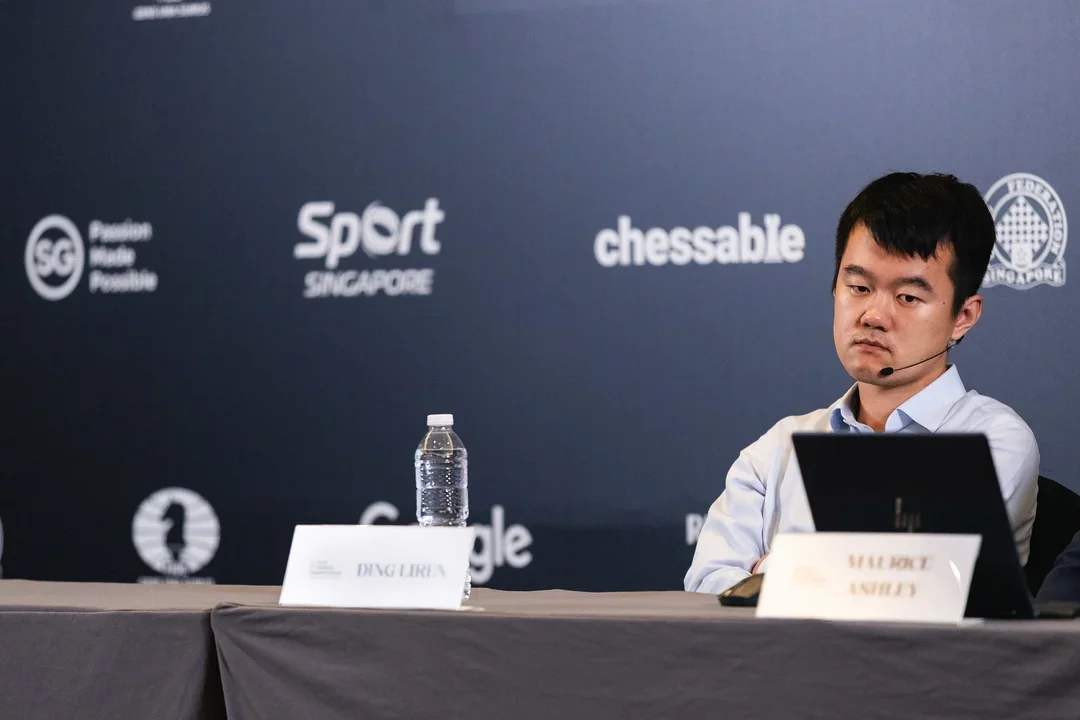18 for 18: 18-year-old Gukesh Dommaraju Becomes 18th Undisputed World Chess Champion
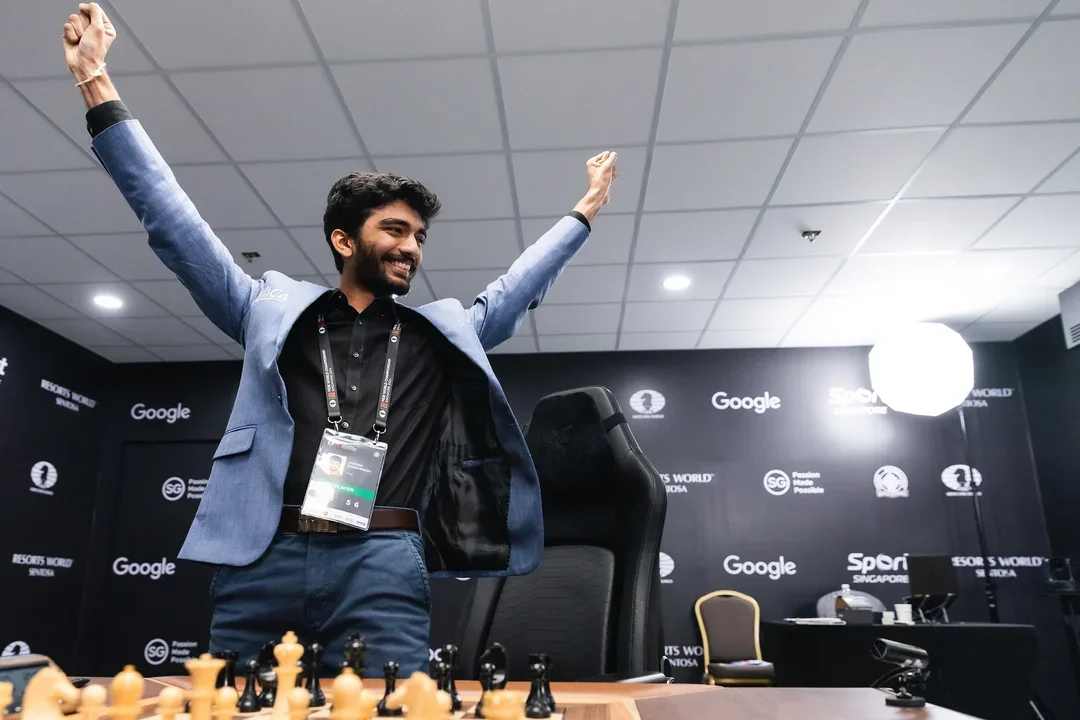
Indian GM Gukesh Dommaraju defeated reigning FIDE World Champion GM Ding Liren (China) in the 14th and final game of the 2024 FIDE World Chess Championship, winning the match 7½–6½ on Thursday, December 12 after two-and-a-half weeks of play.
At 18 years old, Gukesh becomes the youngest champion in history, breaking GM Garry Kasparov's record by four years. Gukesh is only the second Indian player to win the title, following GM Viswanathan Anand, who was FIDE World Champion from 2000 through 2002 and undisputed World Champion from 2007 until losing to GM Magnus Carlsen in 2013. This was Ding's first championship match since defeating Russian GM Ian Nepomniachtchi in tiebreakers last April to become the 17th undisputed world champion.
He entered as the Challenger; he exited as the WORLD CHAMPION! @DGukesh 🇮🇳 👏 ♟️
🔥 Gukesh D leaves the venue right after becoming World Champion! A big hug with his dad, Dr. Rajinikanth, a big hug with his second, Grzegorz Gajewski, and off to the bus for the final press… pic.twitter.com/94UVZRgulK— International Chess Federation (@FIDE_chess) December 12, 2024
This was never going to be an easy match to predict, as evidenced by US Chess Marketing and Communications Manager Bryan Tillis's video summarizing the differing opinions of multiple grandmasters. Ding had plummeted out of the world top five rankings into the 20s, while Gukesh had risen in that same time from the 20s into the top five. The match would be one of youth versus experience, momentum versus longevity.
Rounds 11 through 14 encapsulated the frenetic uncertainty of the match in a nutshell. Depending on when the viewer tuned in, Gukesh could be up an hour on the clock and totally in control, or he could be quickly burning time as he drifts towards a worse position by following an inaccurate plan. Ding was equally likely to confidently blitz out the only defensive move in a tough position or make a game-ending blunder in a relatively tame one.
After trading wins before Tuesday's final rest day, Gukesh entered the penultimate round with the white pieces. The longer the match went on, the more comfortable Ding seemed taking the match to tiebreakers. After all, Ding won the 2023 match this way, and, despite being behind on the clock in most games, he seemed to be at his most comfortable when short on time.
If Gukesh ever considered trying to play it safe (and he almost certainly never did), he definitely was no longer going to follow that strategy now. Indeed, he came prepared with a novelty out of the opening on Wednesday against Ding's French Defense, and managed to achieve in an incredibly promising position shortly thereafter. Today's annotations come from Chess Life columnist GM Joel Benjamin:
As if Ding's 12th-round counter-punch after losing the 11th game wasn't shocking enough, the way he survived this game was positively Rasputin-esque. If Ding can draw despite being caught off guard in the opening, missing Gukesh's 22. Bf4!, and then allowing a royal family fork, what will it take to defeat this guy?!
Avoiding disaster, however, made Ding even more confident in his strategy to just survive the last classical game and make it to Friday's rapid tiebreakers. It's hard to say whether this itself was a mistake, as pushing too hard to win in an even match could also have easily backfired. But, instead, Ding became a bit impatient to rush into a pawn-down endgame for the second consecutive game. As Benjamin points out, it's one thing to play like this in a pure rook-and-pawn endgame with pawns on the same side, but quite another with the presence of same-colored bishops.
Of Ding's catastrophic 55. Rf2??, Benjamin writes, "We have a moment that will live on in chess infamy," and it is hard to argue with that. As Benjamin explains in the annotations above, the downside to playing for a draw is that it can become increasingly to overlook key details and hallucinate a forced draw that isn't there.
"No game tomorrow," was the first thing a despondent Ding had to say in the post-game press conference. The 17th World Champion had always been admirably and uniquely candid in discussing his own emotions and feelings both during his last match and in the lead-up to this one, and there was nothing much else to say. He was aware that he was not playing his best chess, and that he would need to step it up if he wanted to defend his title. For much of this match, he was playing at a higher level than his recent form, referring to his 12th-round victory as perhaps his best win in several years. But the cruelty of chess is such that it only takes one lapse in judgment to undo a game's worth (or a match's worth) of good moves.
What's next for Ding? In the past, the loser of the championship match was automatically slotted into the next Candidates tournament, but changes made earlier this year did away with this qualification spot. If Ding wants another shot at the title, then, we should expect to see him playing rather regularly in 2025.
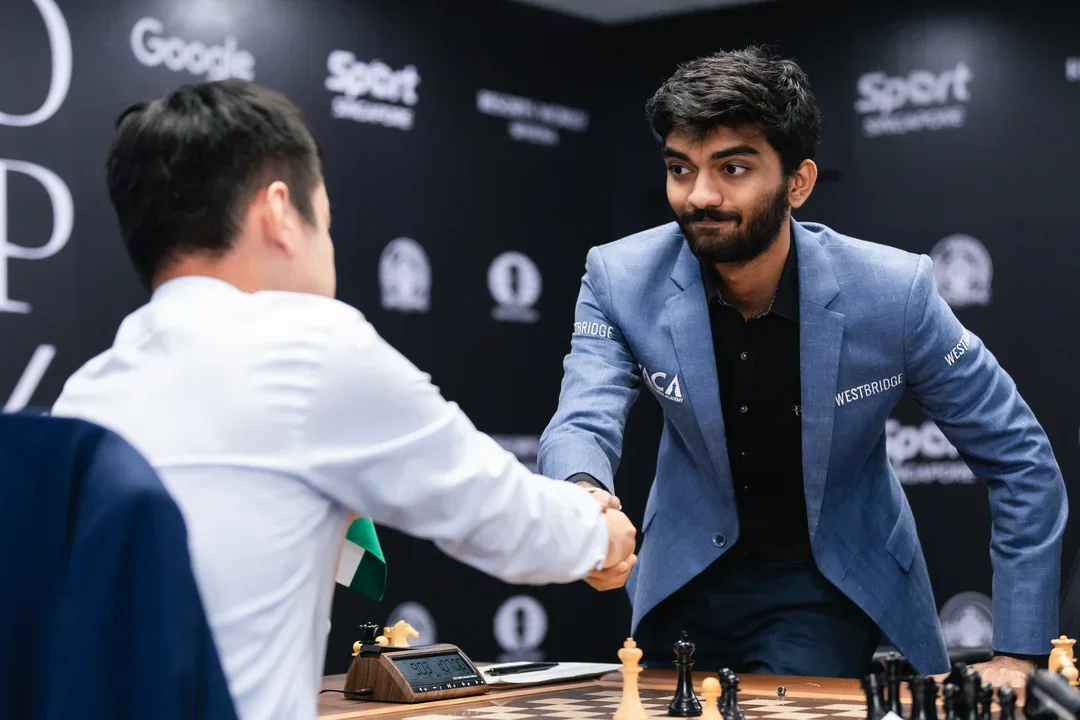
With the match over, it was finally time for Gukesh to reveal his team of seconds. While the inclusion of Anand was hardly a secret and countryman Pentala Harikrishna's inclusion also expected, the rest of the list was a global who's who of top talent:
Gukesh has now revealed his winning team:
🇵🇱 Grzegorz Gajewski
🇵🇱 Radoslaw Wojtaszek
🇮🇳 Pentala Harikrishna
🇩🇪 Vincent Keymer
🇵🇱 Jan-Krzysztof Duda
🇵🇱 Jan Klimkowski
🇮🇳 Vishy Anand
🇿🇦 Paddy Upton pic.twitter.com/NyEfLWXL44— Chess.com (@chesscom) December 12, 2024
Next up for Gukesh is the 2024 FIDE World Rapid & Blitz Championship, beginning December 26 in New York. It's easy to miss the World Champion on the list of participants, as his outdated rapid rating of 2654 has him seeded only 25th. But first, Gukesh has planned some rest and relaxation with his team:
🇮🇳 Gukesh D will be going Bungee jumping!
He reveals how the decision to go bungee jumping came about! 🪂#DingGukesh pic.twitter.com/cDwpP75jLM— International Chess Federation (@FIDE_chess) December 12, 2024
Quick Links
Read all match coverage on Chess Life Online
Find archived coverage of past events here
Watch live commentary from each round on Chess.com and lichess.org
Categories
Archives
- January 2026 (2)
- December 2025 (27)
- November 2025 (29)
- October 2025 (39)
- September 2025 (27)
- August 2025 (29)
- July 2025 (43)
- June 2025 (25)
- May 2025 (24)
- April 2025 (29)
- March 2025 (29)
- February 2025 (20)
- January 2025 (24)
- December 2024 (34)
- November 2024 (18)
- October 2024 (35)
- September 2024 (23)
- August 2024 (27)
- July 2024 (44)
- June 2024 (27)
- May 2024 (31)
- April 2024 (51)
- March 2024 (34)
- February 2024 (25)
- January 2024 (26)
- December 2023 (29)
- November 2023 (26)
- October 2023 (37)
- September 2023 (27)
- August 2023 (37)
- July 2023 (47)
- June 2023 (33)
- May 2023 (37)
- April 2023 (45)
- March 2023 (37)
- February 2023 (28)
- January 2023 (31)
- December 2022 (23)
- November 2022 (32)
- October 2022 (31)
- September 2022 (19)
- August 2022 (39)
- July 2022 (32)
- June 2022 (35)
- May 2022 (21)
- April 2022 (31)
- March 2022 (33)
- February 2022 (21)
- January 2022 (27)
- December 2021 (36)
- November 2021 (34)
- October 2021 (25)
- September 2021 (25)
- August 2021 (41)
- July 2021 (36)
- June 2021 (29)
- May 2021 (29)
- April 2021 (31)
- March 2021 (33)
- February 2021 (28)
- January 2021 (29)
- December 2020 (38)
- November 2020 (40)
- October 2020 (41)
- September 2020 (35)
- August 2020 (38)
- July 2020 (36)
- June 2020 (46)
- May 2020 (42)
- April 2020 (37)
- March 2020 (60)
- February 2020 (38)
- January 2020 (45)
- December 2019 (34)
- November 2019 (35)
- October 2019 (42)
- September 2019 (45)
- August 2019 (56)
- July 2019 (44)
- June 2019 (35)
- May 2019 (40)
- April 2019 (48)
- March 2019 (61)
- February 2019 (39)
- January 2019 (30)
- December 2018 (29)
- November 2018 (51)
- October 2018 (45)
- September 2018 (29)
- August 2018 (49)
- July 2018 (35)
- June 2018 (31)
- May 2018 (39)
- April 2018 (31)
- March 2018 (26)
- February 2018 (33)
- January 2018 (30)
- December 2017 (26)
- November 2017 (24)
- October 2017 (30)
- September 2017 (30)
- August 2017 (31)
- July 2017 (28)
- June 2017 (32)
- May 2017 (26)
- April 2017 (37)
- March 2017 (28)
- February 2017 (30)
- January 2017 (27)
- December 2016 (29)
- November 2016 (24)
- October 2016 (32)
- September 2016 (31)
- August 2016 (27)
- July 2016 (24)
- June 2016 (26)
- May 2016 (19)
- April 2016 (30)
- March 2016 (36)
- February 2016 (28)
- January 2016 (32)
- December 2015 (26)
- November 2015 (23)
- October 2015 (16)
- September 2015 (28)
- August 2015 (28)
- July 2015 (6)
- June 2015 (1)
- May 2015 (2)
- April 2015 (1)
- February 2015 (3)
- January 2015 (1)
- December 2014 (1)
- July 2010 (1)
- October 1991 (1)
- August 1989 (1)
- January 1988 (1)
- December 1983 (1)



